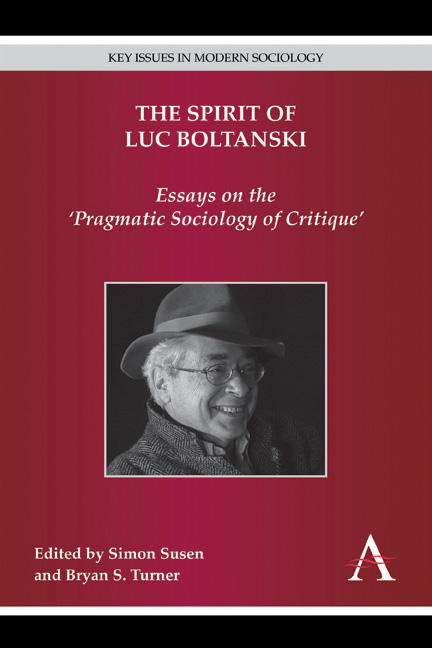Book contents
- Frontmatter
- CONTENTS
- List of Contributors
- Preface
- Part I Introductory Remarks
- Part II Luc Boltanski and (Post-) Classical Sociology
- Part III Luc Boltanski and Pragmatism
- Part IV Luc Boltanski and Critique
- Part V Luc Boltanski and Critical Sociology
- Part VI Luc Boltanski and Political Sociology
- Part VII Luc Boltanski and Contemporary Issues
- Part VIII Luc Boltanski in Conversation
- 22 An Introduction to ‘“Whatever Works”: Political Philosophy and Sociology – Luc Boltanski in Conversation with Craig Browne’
- 23 ‘Whatever Works’: Political Philosophy and Sociology – Luc Boltanski in Conversation with Craig Browne
- 24 Sociology of Critique or Critical Theory? Luc Boltanski and Axel Honneth in Conversation with Robin Celikates
- 25 The Fragility of Reality: Luc Boltanski in Conversation with Juliette Rennes and Simon Susen
- Part IX Luc Boltanski and His Critics
- Index of Names
- Index of Subjects
23 - ‘Whatever Works’: Political Philosophy and Sociology – Luc Boltanski in Conversation with Craig Browne
from Part VIII - Luc Boltanski in Conversation
Published online by Cambridge University Press: 05 December 2014
- Frontmatter
- CONTENTS
- List of Contributors
- Preface
- Part I Introductory Remarks
- Part II Luc Boltanski and (Post-) Classical Sociology
- Part III Luc Boltanski and Pragmatism
- Part IV Luc Boltanski and Critique
- Part V Luc Boltanski and Critical Sociology
- Part VI Luc Boltanski and Political Sociology
- Part VII Luc Boltanski and Contemporary Issues
- Part VIII Luc Boltanski in Conversation
- 22 An Introduction to ‘“Whatever Works”: Political Philosophy and Sociology – Luc Boltanski in Conversation with Craig Browne’
- 23 ‘Whatever Works’: Political Philosophy and Sociology – Luc Boltanski in Conversation with Craig Browne
- 24 Sociology of Critique or Critical Theory? Luc Boltanski and Axel Honneth in Conversation with Robin Celikates
- 25 The Fragility of Reality: Luc Boltanski in Conversation with Juliette Rennes and Simon Susen
- Part IX Luc Boltanski and His Critics
- Index of Names
- Index of Subjects
Summary
Craig Browne: What I would like to discuss with you is the relationship between social theory – or, more broadly, the social sciences – and political philosophy. I am interested in how this relationship has changed, particularly over the last thirty years; I think that there may have been a significant change in this relationship. Before this period, there was the idea that social theory, or sociology, was somehow taking over questions of political philosophy and that political philosophy was even being superseded by approaches informed by the social sciences. Yet, over the course of the last thirty years or more – that is, subsequent to the publication of John Rawls's A Theory of Justice (1971), and with other social theorists, particularly Jürgen Habermas, moving away from sociology and towards political theory and political philosophy – I think that this relationship between social theory and political philosophy has changed and may even have reversed itself. No doubt, as the examples I just gave suggest, political philosophy has undergone a kind of revival and it may be argued that it has become more significant for social theory. My initial question, then, is as follows: Do you agree with this overview? Or, do you have a different perspective on the relationship between political philosophy and social theory? Of course, I am interested in how you position yourself in terms of these discussions, and we can then take up how you have pursued this topic in your own work.
Luc Boltanski: I would like to say something before I address your question. It is that I am not a ‘social theorist’, and I disagree with a common construction of social theorists. There is today an increasingly rigid division between empirical sociology – or empirical social sciences – and theoretical discussions and social theory. This division began in the Anglo-Saxon world; in my opinion, it is very dangerous because, in the kind of environment in which I was trained – that is, in the 1970s around Pierre Bourdieu, but not only Bourdieu – it was very important for us never to disconnect fieldwork and the critical point of view of social theory.
- Type
- Chapter
- Information
- The Spirit of Luc BoltanskiEssays on the 'Pragmatic Sociology of Critique', pp. 549 - 560Publisher: Anthem PressPrint publication year: 2014

